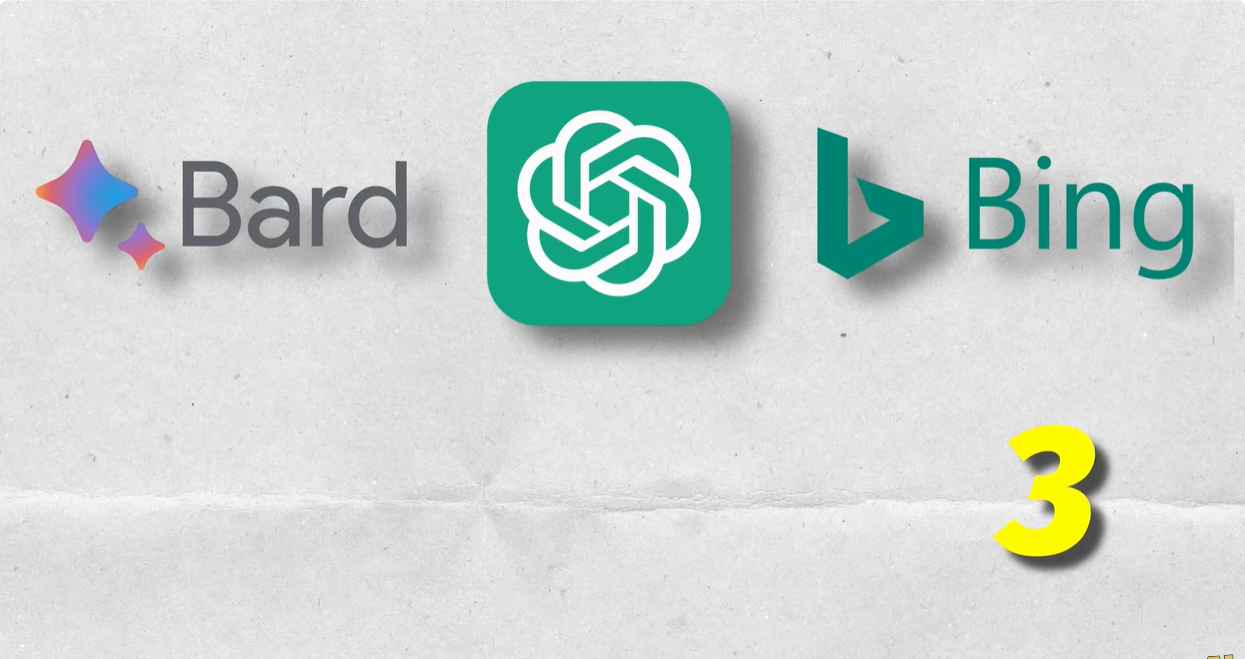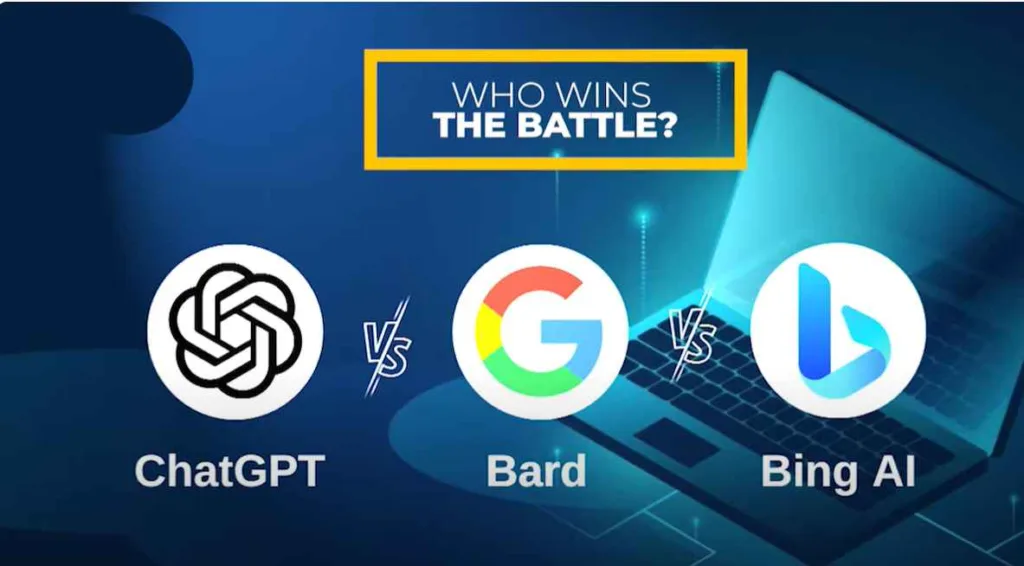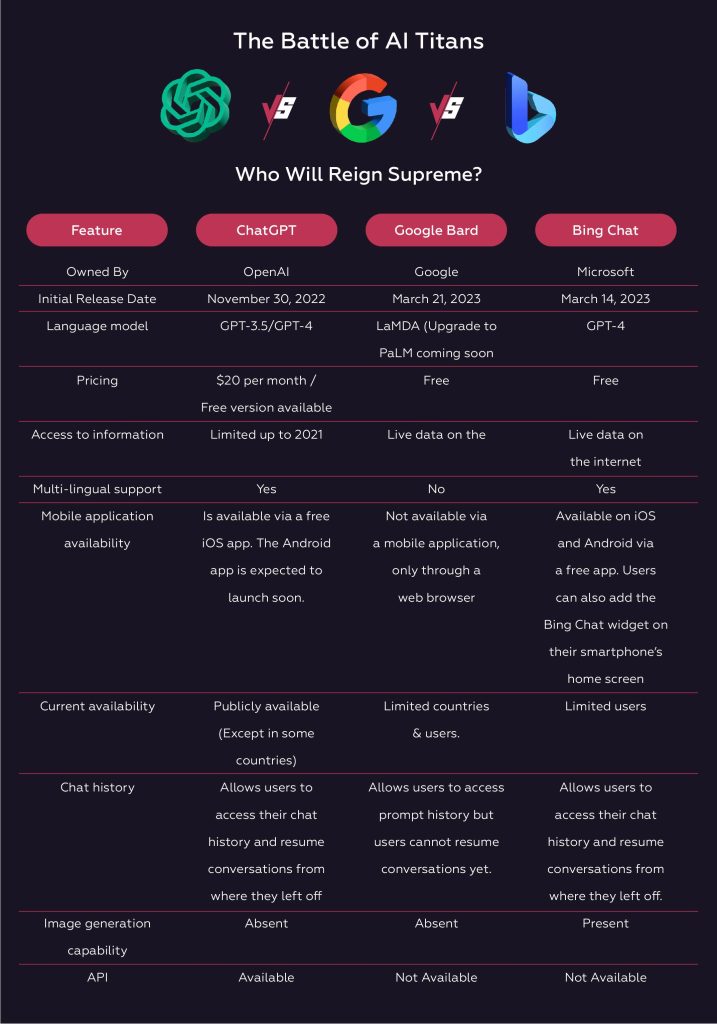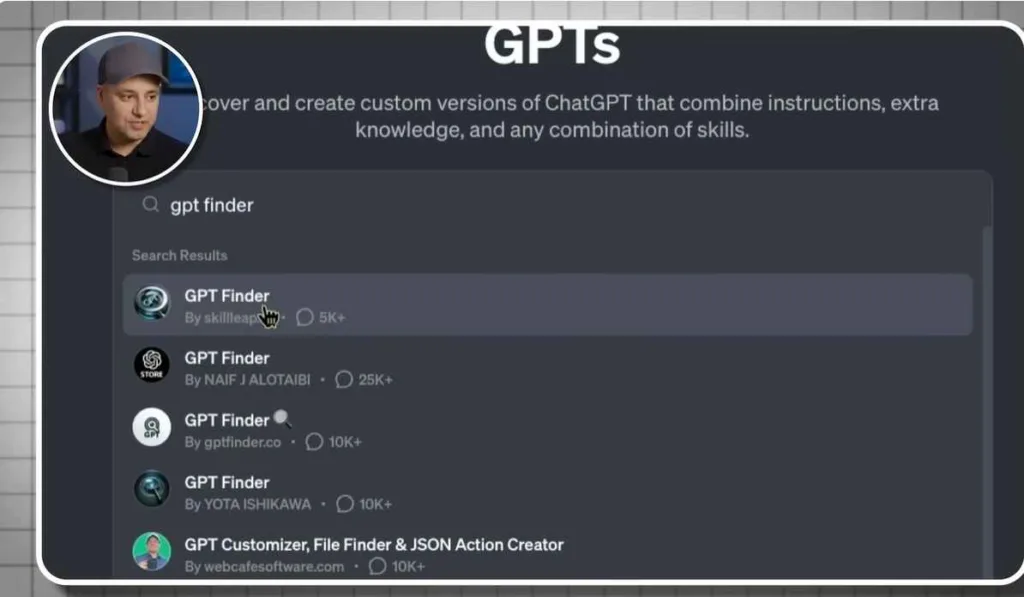Physical Address
304 North Cardinal St.
Dorchester Center, MA 02124

OpenAI, the creator of ChatGPT, competes against Google’s Bard and Microsoft’s Bing AI in the evolving AI chatbot landscape. Each platform aims to enhance user experience with conversational AI and search capabilities. So the Battle Among the Best Open AI vs Bard vs Bing AI will be epic to watch.
The tech industry is abuzz with the latest advancements in artificial intelligence, specifically within the world of interactive chatbots and improved search functionalities.
OpenAI has made significant strides with ChatGPT, an AI built on the powerful GPT (Generative Pre-trained Transformer) series.
On the other side of the competition, Google’s Bard, drawing on the vast information from the search engine giant, seeks to provide informative and conversational AI experiences.
Meanwhile, Microsoft’s integration of AI into Bing aims to redefine search experiences by offering more nuanced and conversational interactions.
As these platforms evolve, they are set to transform how users obtain information and interact with the digital world, each with its unique strengths and approach to user engagement.

The tech world stands on the brink of a revolution, witnessing the emergence of AI giants that promise to transform how we interact with digital information.
This is the dawn of AI titans – an era where artificial intelligence reshapes search engines, content creation, and the digital interaction landscape.
Let’s introduce the key players in this game of virtual giants.
OpenAI, the brain behind the viral sensation ChatGPT, marks a significant leap in AI-enabled communication.
With GPT-3, its language comprehension skills challenge the status quo, offering users creative solutions and smart assistant capabilities.
Key features of OpenAI include:
With Bard, Google brings its contender to the AI arena. Powered by LaMDA, Bard seeks to integrate knowledge and creativity, enriching conversations across the web.
Highlights of Google’s Bard:
Bing AI, propelled by the partnership of Microsoft and OpenAI, digs into the competition with a unique angle.
This new AI-infused search engine aims to redefine search experiences with personalized results and interactive chats.
| Bing AI Strengths |
|---|
| Intuitive search enhancements |
| Chat-based interactions |
| User-centric design |

Credit: rollcodigital.com
Delving into the powerhouses behind today’s AI revolution, we uncover how OpenAI’s GPT-3.5, Google’s Bard, and Microsoft’s Bing AI are redefining human-tech interaction.
Each engine boasts unique capabilities designed to meet our digital demands. Let’s find the cutting-edge technology fueling these groundbreaking AI models.
OpenAI’s GPT-3.5 stands as a colossal force in natural language processing. With an impressive 175 billion parameters, its linguistic abilities are vast.
Imagine a virtual brain that can write poems, code software, and even mimic human chat. GPT-3.5 achieves this with a blend of algorithms, data, and clever design:
Google’s brainchild, Bard, operates on an architecture known as the Language Model for Dialogue Applications (LaMDA).
LaMDA’s design focuses on conversation. This model thrives on its ability to comprehend and partake in open-ended dialogue. Key attributes include:
Microsoft revolutionizes search with its Bing AI, embedding AI directly into its search engine. Users interact seamlessly, gaining insights alongside web results.
Bing AI extends beyond mere information retrieval, harnessing the power of:
| Feature | Benefit |
|---|---|
| Chat-based interface | Intuitive and natural interactions. |
| Contextual Mastering | Provides relevant results and suggestions. |
| Integration with Microsoft products | Access across the Microsoft ecosystem. |
The digital landscape brims with innovation as three AI giants, OpenAI, Bard, and Bing AI, shape the future of user interaction and information retrieval.
Each platform showcases distinct strengths, creating unique experiences tailored to diverse user needs.
Discussing these titans, we uncover the specialized capabilities that set them apart in their contributions to AI technology.
OpenAI, known for its trailblazing GPT models, excels in engaging users through natural, human-like conversations.
Users savor interactive experiences that feel remarkably similar to chatting with a friend. OpenAI’s technology also powers creativity and productivity tools. It enables people and businesses to craft content, generate code, and automate tasks with remarkable efficiency.
The entrance of Google’s Bard leverages the vastness of the web for a deep well of knowledge.
With access to a colossal database, Bard provides insightful answers, aiming to educate while entertaining.
Its knowledge-focused approach ensures users can trust the depth and reliability of the information presented.
| Feature | Description |
|---|---|
| Insightful Answers | Delivers detailed and accurate responses. |
| Educational Focus | Improves learning through interactive dialogue. |
Bing AI, embedded within Microsoft’s search engine, offers seamless search integration. It streamlines data retrieval, merging comprehensive search results with efficient AI assistance.
Bing AI simplifies tasks like shopping, fact-checking, and wandering the web, positioning itself as a go-to digital assistant for users worldwide.

Credit: cointelegraph.com
The arrival of OpenAI, Bard, and Bing AI marks a turning point in how we interact with search engines.
Embracing natural language processing and machine learning, these tech giants are redefining the search landscape.
This shift has profound implications for user behavior and the digital marketing ecosystem.
Users now expect more conversational and accurate interactions with search engines. Long-tail queries grow more common, as people seek comprehensive, precise answers.
The focus shifts from keywords to intent, as AI seeks to grasp and respond to user needs in full context.
SEO strategies must now account for these advanced AI capabilities. Content creators focus on rich, informative material that caters to AI’s grasping of user intent.
Quality trumps quantity, with an emphasis on relevance and authority.
OpenAI, Bard, and Bing AI shape our digital future. They hold great power. With power comes big responsibility. We must discuss how safely they handle our data. Important too, are the morals of their actions. This section digs into these vital issues.
Data security is key in AI. These tools learn from huge data amounts. They use this data to work better. We must be sure this data stays safe. Companies must protect this data from misuse or theft. Let’s look at how OpenAI, Bard, and Bing AI keep our data secure.
Bias in AI can be a big problem. These tools can show unfair preferences. What they learn can affect this. It’s a tricky issue. They must be fair to everyone.
Factual integrity is another must. These AI tools should give us true information. Lies can lead us wrong. Keeping facts right is vital. OpenAI, Bard, and Bing AI strive for accuracy. Still, there’s room to grow.
| AI Tool | Measures Against Bias | Measures for Fact-Checking |
|---|---|---|
| OpenAI | Diverse data sets | Regular updates |
| Bard | Bias training | Expert reviews |
| Bing AI | User feedback loop | Cross-referencing sources |
The digital era ushers in a colossal clash of titans: OpenAI, Bard, and Bing AI. Each contender sharpens its prowess waiting to claim the crown of AI supremacy.
This battleground won’t just reshape our online experiences—it promises to revolutionize our very interaction with technology.

Continuous innovation is key to staying ahead in the AI arms race. Every player, from OpenAI to Bing AI, constantly refines their algorithms.
They strive for groundbreaking advancements. An agile approach to AI development ensures they adapt to user needs swiftly.
Companies must maintain a balance between speed and accuracy. They need to offer secure, reliable services. This ensures trust with their users.
The AI landscape is ripe for disruption. New competitors may emerge, introducing fresh perspectives and technologies. Innovation is the catalyst that could propel a dark horse to lead the charge.
| Element | Impact on AI Battlefield |
|---|---|
| Machine learning advancements | New algorithms that learn faster and with more precision |
| Quantum computing | Extreme speed could revamp the entire data-processing world |
| AI ethics and governance | Frameworks ensuring AI is used responsibly |
Upcoming startups may focus on niche segments. There, they can offer tailored solutions. Interdisciplinary breakthroughs might also shape the new standard in AI technology.
OpenAI’s platform offers advanced natural language processing through models like GPT-3. It excels in generating human-like text, translating languages, and answering questions. The platform is renowned for its versatility in different AI tasks, catering to a broad range of applications.
An inquiry into whether Google’s Bard, likely a product or service, is available without cost. To find out, one would need to explore the terms and conditions of Google’s Bard offering or check the official documentation for information on its pricing model.
Bard AI, developed by Google, leverages LaMDA to provide conversational AI experiences. It integrates with Google’s search ecosystem, enabling users to get contextually aware, natural language responses that are deeply rooted in comprehending the abundance of data available on the web.
No, Bing AI is not the same as OpenAI. Bing AI is a suite of artificial intelligence technologies developed by Microsoft to enhance its search engine, while OpenAI is an independent research organization focused on advancing artificial intelligence in a broader context, developing models like GPT-3.
Bing AI incorporates Microsoft’s AI capabilities and is often integrated with its search engine, ensuring seamless access to information. It provides direct answers and assistance within the Bing search platform, focusing on information accuracy and user context to increase search relevance.
Yes, OpenAI can be implemented in business scenarios, such as automated customer service, content creation, and data analysis. Its adaptable framework makes it suitable for many enterprise applications, aiming to streamline operations and improve customer engagement.
As we navigate the evolving landscape of artificial intelligence, OpenAI, Bard, and Bing AI offer distinct flavors of innovation. Each platform possesses unique strengths tailored for varied use cases. Adopt the AI that aligns with your objectives, and watch as it transforms how we interact with technology.
Stay tuned for the burgeoning AI revolution.